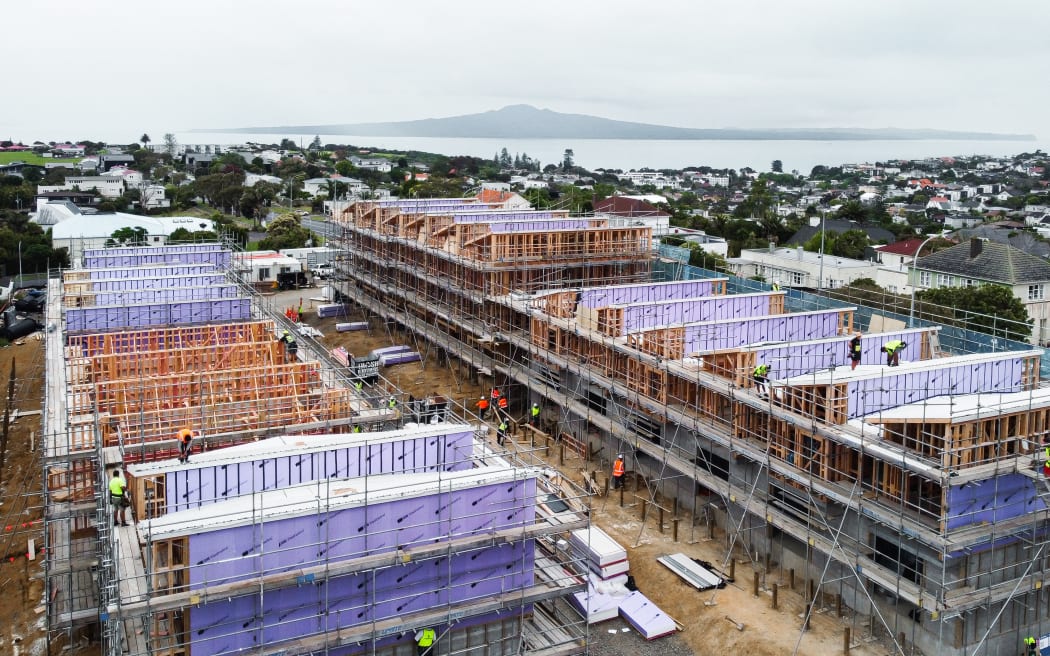
Construction at Hawaiki St, Ōrākei, on land owned by Ngāti Whātua Ōrākei Photo: supplied
A new collaboration between the BNZ and Ngāti Whātua Ōrākei in Auckland means that for the first time, home loans at standard home loan rates, are being made available for building on iwi land.
Banks have traditionally been reluctant to offer home loans for housing on communally owned land because they can't use the land as security for the loans.
But the BNZ and Ngāti Whātua Ōrākei have negotiated an agreement where, in the event of a distressed mortgage, the hapū would take over. Fourteen homes are under construction in Hawaiki St, Ōrākei as part of the hapū's ambitious housing development on the historic site.
Nine to Noon spoke with BNZ head of Māori banking Whetu Rangi, and the trust's chief executive Lisa Davis.
Rangi said businesses were still trying to understand how to make the financial system and the competing objectives of Māori organisations work together.
For entities such as the Ngāti Whātua Ōrākei Trust their sole responsibility was to protect the whenua (land) for future generations.
"For us as a bank if we are wanting to enable that asset and leverage that asset like you would for purchasing a home we also need to protect ourselves in a worst-case scenario.
"So you can see a natural mis-alignment there."
As well, it was complicated by Reserve Bank regulations on aspects such as how much a bank could lend depending on the security or property type.
"There are numerous parts that make transactions like this incredibly difficult."
For the Ōrākei deal, "a multi-layered structure" had been agreed. The trust was giving long-term leases to potential homeowners while the BNZ was taking a charge over that lease so loans could be provided to individual homeowners.
Under "a deed of understanding", in the event of a default the trust would step in to protect the house for the homeowner's relatives.
"So that we will never have to step in and sell off a property at a mortgagee sale unless it's a really dire situation."
The bank was very keen to avoid the sale of whenua that was important to the trust, Rangi said.
Potential buyers pooling funds
Davis said all up there would be 24 terraced homes which would be a mix of sizes from one bedroom to four.
Those interested included young families, sisters and cousins who were combining their money so they could purchase.
"So this is really opening up an opportunity and access to housing for our whānau."
Over the last 20 years the trust had undertaken different types of housing projects.
In the past the trust had to take out mortgages, but this time individual homeowners would take on the mortgage with the trust's support as they navigated the process.
She said the bank had been very supportive because there were many "nuts and bolts" to deal with.
Davis said the homes should be finished by September, however, the trust also had plans for more housing including some for kaumatua and kuia that were being built close to their marae.
Blueprint for other similar projects?
She said while the trust recognised it would not solve all the challenges for iwi and for Māori landowners around the motu she hoped it would "pave the way" for similar conversations and initiatives nationwide.
"There's an opportunity here to create partnerships that look at bespoke solutions that also provide impacts for whānau.
"So while this is unique in its form I think it's the first of many that should happen and be considered across the country. It's around collaboration - just the willingness to have a conversation and probably look at all the different possibilities outside the regulatory system as well."
Rangi said a similar structure could be applied to iwi, hapū and whānau around Aotearoa.
While not all would have the financial clout of Ngāti Whātua Ōrākei, the trust was willing to share its knowledge with small organisations.
"We as a bank - our goal is to replicate this model across the country so that our rural areas can benefit from it."

